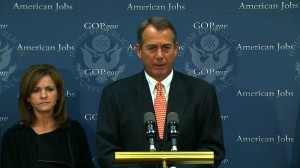
(CNN) — The R-rated insult House Speaker John Boehner hurled upon Senate Majority Leader Harry Reid last week at the White House was a deviation from the normally diplomatic language of official Washington.
After all, it isn’t every day that reports emerge of a top lawmaker telling another to “Go f*** yourself.”
But it’s certainly not the first time a politician let slip what they were really thinking.
Then-Vice President Dick Cheney had a few choice words for Sen. Patrick Leahy in 2004 after the Vermont Democrat publicly questioned the vice president’s ties to Halliburton, the oil field services company Cheney previously ran.
Sources who related the incident to CNN said the vice president told Leahy either “F*** off” or “Go f*** yourself” when the two ran into each other while the Senate was having its official group photo taken.
“I think he was just having a bad day,” Leahy said afterwards. “I was kind of shocked to hear that kind of language on the [Senate] floor.”
It wasn’t the first time Cheney had a brush with profanity on a public stage — his then-running mate George W. Bush called a newspaper reporter an “a**hole” during a joint campaign appearance in 2000. Cheney nodded in agreement, saying, “Big time.”
Democrats are equally guilty of using adult language during private moments of frustration — or in Vice President Joe Biden’s case, excitement.
A jubilant Biden leaned toward President Barack Obama and said, “This is a big f***king deal” before the president signed landmark health care legislation in 2010.
A microphone picked up the vice president’s comments, and the censored acronym “BFD” soon started appearing on coffee mugs and t-shirts peddled by Obama’s political organization.
Another Obama confidante, Chicago Mayor Rahm Emanuel, has left a legacy of swearing through the various posts he’s held, from Clinton aide to Illinois congressman to Obama’s chief of staff.
One anecdote puts Emanuel in the face of Tony Blair, telling the British Prime Minister before an appearance with Bill Clinton: “This is important. Don’t f*** it up!” That was during the scandal involving Clinton and White House intern Monica Lewinsky.
Obama himself — widely known for his “no drama” demeanor — told the “Today Show” during the Gulf Coast oil disaster that he was looking for “whose a** to kick.” And during the 2012 presidential campaign, Obama termed his rival Mitt Romney a “bullsh***er” in an interview with Rolling Stone.
By all accounts, Romney himself was not prone to using curse words, either in public or in private. His anachronistic phrases, like “good heavens” and “golly,” were about as vulgar as the former Massachusetts governor got on the campaign trail.
Presidents going decades back used profanity in their private conversations, though the absence of 24-hour cable news and the internet meant unguarded moments were less frequently made public.
When tape recordings of Richard Nixon were made public during the Watergate scandal, the phrase “expletive deleted” was littered through the transcripts. And his predecessor, Lyndon B. Johnson, was apparently worse; Nixon said when talking about his penchant for profanity, “People said my language was bad, but Jesus, you should have heard LBJ.”
And before that, John F. Kennedy was recorded dressing-down an Air Force general after a report in the Washington Post showed an extravagant — and expensive — renovation aboard Air Force One.
“Well this is obviously a f***-up,” Kennedy concluded after calling the man responsible for the article a “silly bastard.”
One president who wasn’t a fan of vulgarity — at least among his military — was George Washington. He made it known through his generals that he despised the “foolish and wicked practice of profane cursing and swearing” that he viewed as rampant among his troops.
Imagine what he’d think of Boehner.











